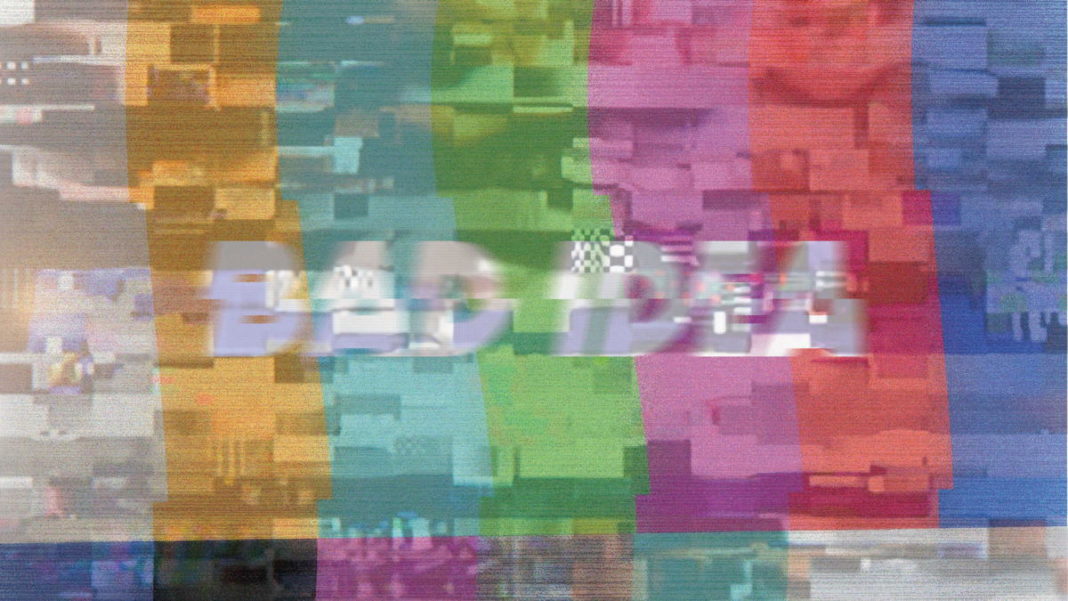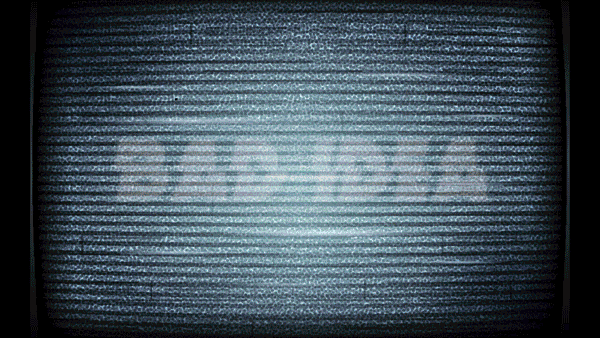There are, perhaps, dueling takes on new publisher Bad Idea, which announced itself this month.
Bad Idea is a winking name for a company using a non-conventional distribution model, one that seems poised to struggle. It’s primarily the work of Dinesh Shamdasani and Warren Simons, co-CEOs and co-chief creative officers now who helped revive Valiant’s superhero universe last decade. Here are the basics: Bad Idea plans to forego Diamond Comic Distributors, Inc. (the long-unchallenged king of direct market distribution). It plans to distribute books itself to 20 deliberately-chosen stores at launch. There will be no variant covers, and Bad Idea is foregoing the digital editions and trade paperback collections that serve as an availability safetynet for many readers.
The glass half empty view: Bad Idea is deliberately creating exclusionary scarcity, with the full-blown cynical take being this isn’t a comics venture at all but a Hollywood play (although those lines are blurry nowadays).
The glass half full view: nobody really likes the distribution status quo, and Bad Idea’s plans have potential to be an alternative, with a more practical take being this is simply a PR move to spin a new publisher’s cautious limiting of fiscal risk as it gauges demand for product.
Regardless of glass depth, Bad Idea is an interesting conversation piece, an outlier among the young publishing ventures that have steadily launched in recent years. As such, The Beat recently got on the phone with Shamdasani, Simons, and Bad Idea publisher Hunter Gorinson, asking them to elaborate.
Here’s what they had to say, edited for clarity, of course…
THE BEAT: I think it’s fair to say your announcement has been controversial. How are you feeling about the reaction to Bad Idea….
SHAMDASANI: We underestimated demand. We’ve been making comics together a long time, and we thought it would be fun to get together, take away unnecessary stuff involved with making comics, and just see if we could make really cool comics — we didn’t think that many people would be interested. We’re under a mountain of emails, DMs, texts — it’s been overwhelming. It’s been shocking.
THE BEAT: One impression I had was that you’re not looking for the biggest or most prominent retailers. What are some of the things you’re looking for?
SHAMDASANI: If we were chasing the biggest retailers and biggest numbers, this is not what we’d be doing. Hence, one of the meanings behind the name Bad Idea.
It’s about the kind of journey we’ve all had reading our favorite comic books. You do it in a physical format in a kind of mecca, a church that the best retail stores are. That could be a store that’s not as big. There are stores that create an environment where you engage with the community, you engage with a knowledgeable store owner. You get your eyes opened to new kinds of stories you didn’t know existed. You learn about new artists and writers. That’s what we’re looking for.
GORINSON: Our thought process has never been to seek out the biggest stores or cities. We’re interested in working with stores where books can grow organically and find fans. Part of how this “Bad Idea” came to fruition is we looked at everything we’d learned in comics and at what is going on in the industry now. What you see is every time a new publisher comes on the scene, they have to make the most noise possible, the biggest footprint at once.
Conventional wisdom says if you don’t make the biggest splash, no one pays attention. We think that’s a broken model. We wanted to do more with less, not say to every person in the industry, you have to order hundreds of copies of our new #1s, and we have eight of them.
SHAMDASANI: Then they sit on shelves. No one needs that. That’s not good for anybody.
GORINSON: We’re going to start small and grow our footprint on a store-by-store basis. We’ll talk about the stores on our list — which has not been locked yet — as partners, and we mean that. We want to work with stores on an individual basis to figure out what makes Bad Idea books work in their stores, and we’ll grow readership like that. It’s a little bit of a throwback to how comics were before everyone was locked into the previews cycle, promoting everything months ahead constantly.
SHAMDASANI: It’s also about efficiency. We’ve all spent a long time in comics, and you come to learn things. You learn these types of books aren’t for every store. We don’t want to force someone to spend time thinking about our books if our books are not for them. There are stores that only stock Marvel. They don’t even stock DC. There are stores that only stock the Big 2, and there are stores that are very aggressive about stocking these kind of books. At Valiant, 80 percent of our sales came from 20 percent of our stores. If we only sell to that 20 percent and we’re efficient, perhaps we can do an even better job building a fanbase and building this company.
THE BEAT: So, you’re getting people talking about what you’re doing while guarding against over-extending too quickly. Is a very deliberate slow build part of the plan?
SIMONS: One of the things we’ve talked about is building slowly and meticulously. We’re not going to be coming out of the gate with eight monthly books with 40 variant covers that require us to operate in the red. All three of us have been there, all three of us have seen that. Slow and steady wins the race.
SHAMDASANI: We’re not trying to make books everybody likes. We’re trying to make books some people absolutely love, and that doesn’t start with being Marvel day one. As a music analogy, it starts with playing the smallest clubs before the biggest, by playing CBGBs before Madison Square Garden.
THE BEAT: What sort of comics are you looking to make with Bad Idea?
SIMONS: It starts with the creative, and we have an exceptional group of creators lined up. All of them have unique voices. We haven’t come in and tried to poach the top writers from Marvel and DC, or gone after a celebrity writer. What we’ve done is try to find the kind of creators we’ve worked with in the past who we think are extraordinary, people like Matt Kindt and Doug Braithwaite who are kicking off ENIAC, a really remarkable new book.
I’ve been lucky and fortunate the past 20 years to work on extraordinary titles with extraordinary creators. I was able to relaunch books at Marvel like Iron Man with Matt Fraction and Salvador Larocca, and Thor with JMS and Olivier Coipel…I was able to edit all of Brubaker’s Daredevil run. I worked on all these titles before Valiant. For us the most important thing is quality, not rushing our creators, and trying to build slowly and meticulously to put out some of the best books on the shelves month in and month out.
SHAMDASANI: The freedom we’ve found from not plugging into the traditional system allows us to create books that perhaps other publishers are not incentivized to create. I’m going to be vague, but you’re going to see things from us that seem strange, and no one’s done it before, and it comes from the creative freedom of not having to plug into that whole system.
GORINSON: The challenge Dinesh and Warren have put forth to this amazing stable of creators is to do stuff that is big — gonzo ideas that can only be done in comics — and push the boundaries of the medium. What Matt and Doug are creating with ENIAC is a pitch about the world’s first computer going absolutely bat-shit insane, and secretly guiding the course of the 20th Century. That’s a big crazy idea that can only be in comics.
SHAMDASANI: There’s a reason ENIAC is our launch book. It encapsulates everything we’re excited about. It’s a high concept, the idea that in World War II the allies dropped the bomb on Hiroshima but three months later when the bomb fell on Nagasaki, that was not in our hands — it’s just such a delicious high concept.
SIMONS: We’re going to touch on a little of everything. We’re going to do sci-fi, we’re going to do fantasy, a little bit of surrealism. We’re going to touch all genres.
THE BEAT: What do you envision as the scope of Bad Idea?
SHAMDASANI: We were trying to get to 50 stores in the first year. Based on the initial reaction and the amount of emails we’re getting — I think we’ll have to enlarge it. We’re taking it one step at a time. From there, we’ll just see if this model works. We’re being slow and careful. We want to mitigate difficulties and speedbumps. No one’s ever done this. There’s no road to follow.
GORINSON: In practice, the idea is meant to scale. It’s a little like a platform release for an independent movie. Something like JoJo Rabbit can open in New York and Los Angeles and slowly expand into different markets across the country before it reaches critical mass. What will make our books special is every time a new retailer comes aboard, fans in those stores can go back to the beginning, start at #1, and find out what our books are about. It’s not going to be universal, with every store having the same experience.
SHAMDASANI: We’re going to put a portion of every book we publish in reserve, hold that back, and as new stores become Bad Idea destinations, we’ll open that reserve up, and they’ll be able to order in limited qualities whatever books we’ve released. We’re going to do that for at least the first year, if we can’t do that indefinitely.
THE BEAT: So you’re building in a way to guarantee stores are actually selling books — not just leaving them on shelves — and the people they’re selling to are reading the books, aiming to build a base of loyal customers?
SHAMDASANI: Right, exactly. Look, these are the conversations we’re having. Let’s say there’s a store that’s only a Big 2 store, and the owner is a very nice man. He’ll take our call. We’d see this all the time at Valiant. He’d say, I love everything you guys are doing, but it’s just not for my store. It’s fine. We don’t mind. It’s a waste of his time to go through our solicitations. It’s a waste of our time to try to sell to him. It’s a waste of resources. We’re trying to cut that guy out. We don’t need to waste his time.
Or there’s a store that’s a Marvel store, and they like us, so they order one or two copies. They don’t sell, because the customers are built to be Marvel customers. It’s not worth their time either. On the other hand, there are smaller stores in terms of Marvel orders, but for us, they’re massive stores. Every store in North Carolina for Valiant was huge, and they had the footprint of the biggest stores in the country in terms of sales we saw there, because they had an audience open to these kinds of books who got excited for this kind of material and creators. We’re focusing efforts there.
Over time, we think we’ll be able to expand, but to try to sell to every store on day one? There’d be a lot of echo, and no one likes echo.
THE BEAT: Anything else you wanted to add before we wrap up?
GORINSON: We’re not going to slow down. We’re going to ComicsPro, and we’re going to talk to the best retailers in America. Shortly after we’ll reveal our list of what the 20 participating stores may be, and we have a lot of books in the hopper. We’ve been doing this for 13 months behind the scenes. We have a potent lineup of books we’re excited to get out there.
SIMONS: I’ve been lucky to work with incredible creators on extraordinary books, but pound-for-pound, the books we’re putting out are going to be the best I’ve ever worked on. It’s a remarkable roster, the way we’re going to print the books, the stock we’re going to use — it’s all coming together.
SHAMDASANI: It’s been wonderful to see so much debate. We have so many more bad ideas in terms of the books, ways we put them out — I can’t wait to see the discussion. For anyone who’s reading, whether you’re excited about this or angry, do us a favor and tell the Internet as much as you can, because conversation builds awareness, which is where we’re at right now.
THE BEAT: Thanks for the time guys.
GORINSON: Great. I’ll make sure you have all the art you need for this.
SHAMDASANI: Are we giving him art from anything other than ENIAC, like that book that takes place all on a whale?
GORINSON: We can talk about it.
SHAMDASANI: You were meant to say no and then I pitch the next book and you say no and then I pitch the next book. C’mon, it’s only been two years since we left Valiant! Did you forget how this works?
GORINSON: No, Dinesh…pitch the next book.
SIMONS: Don’t tell him about the pregnant pirate girl!
SHAMDASANI: What about the one where Santa kills an entire town.
SIMONS: No Santa!
THE BEAT: I’m going to be disappointed when that’s not real…
SIMONS: Oh it’s real, those are all real…









You cant create comics people will love if they dont have access to the books to read in the first place. What Bad Idea is doing to creating artificial scarcity and driving up value on release on EBAY.
If Bad Idea really wanted to get books into people’s hands to read, they would do Print On Demand from their website.
Comments are closed.